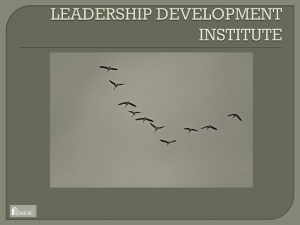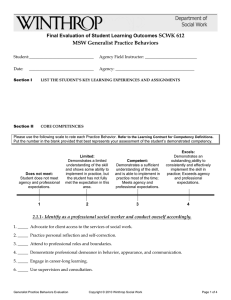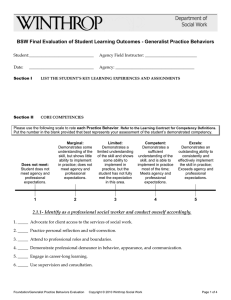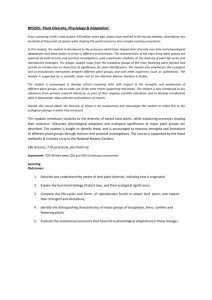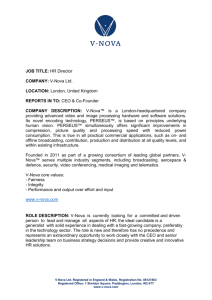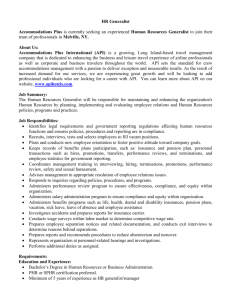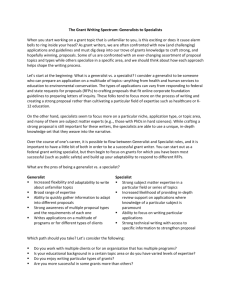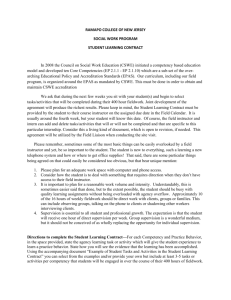Chapter Four The Social Work Environment
advertisement
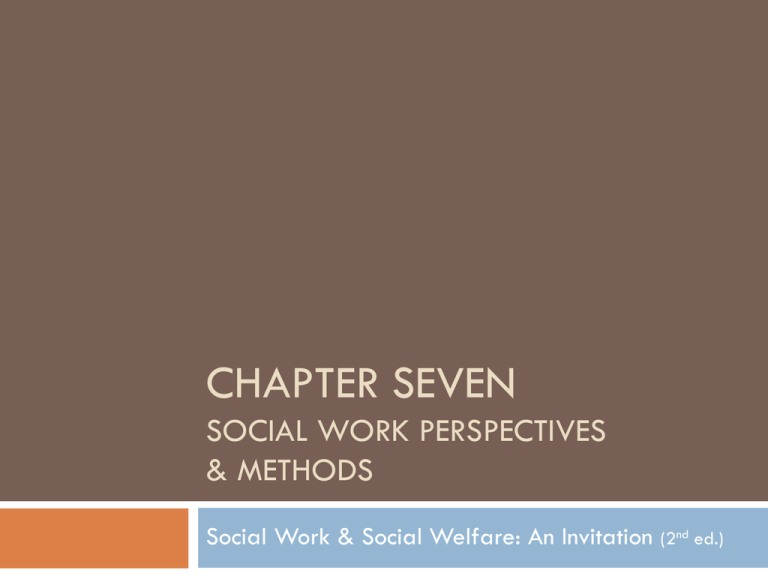
CHAPTER SEVEN SOCIAL WORK PERSPECTIVES & METHODS Social Work & Social Welfare: An Invitation (2nd ed.) Key Ideas Generalist social work practice Levels of practice Skills and roles Theory in Generalist Practice Person in Environment Ecological Perspective Ecomap Systems Theory Empowerment Solution Focused Model Generalist Practice Being able to work with a variety of issues of concerns Being able to work with diverse client systems Being able to influence change at multiple levels or client systems Levels of Practice Micro Direct practice with individuals and families Mezzo Groups Macro Organizations and communities Skills and Roles Direct services Systems linkage Broker, case manager, mediator, advocate Systems maintenance and enhancement Counseling/therapy, group work, educator Organizational analyst, facilitator, team member, consultant, survivor Research System development Program developer, planner, policy developer, advocate Theory in Generalist Practice Theory: an empirically tested concept used to explain behavior, process, or phenomenon Theoretical Perspectives Person in Environment Ecological Perspective Systems Theory Solution Focused Model Person in Environment Perspective The social worker perceives each individual as an interactive participant in a larger physical, social communal, historical, religious, physical, cultural, and familial environmental system Kondrat, 2008, 348 Systems Theory Most used theoretical approach in social work Aids in understanding the multiple and complex lives of families and the systems with which they interact Can be used with: Individuals within family, group, organization, community or society Interactions within any of the above groups Interactions between any of the above groups What is a System? A set of elements that forms an orderly, interrelated, and functional whole Systems Theory continued Enables understanding and use of potential growth in the broad environment Eclectic and integrative perspective Interactions are influenced by mutual feedback process Views self as part of the system/process Emphasizes the dual task that is the purview of social work (PIE) Eco-Map Paper-and-pencil assessment tool used to assess specific troubles and plan intervention for clients A drawing of the client or client family in its social environment. It helps both social worker and client view client’s environmental context from a systems and ecological perspective Eco-Map Helps both social worker and client achieve a holistic or ecological view of the client’s family life and the nature of the family’s relationships with groups, associations, organizations, and other families and individuals Social Environment Commonly Used Symbols in Ecomaps A stressful, conflictladen relationship ++++++++ A tenuous, uncertain relationship --------- A positive relationship or resource _________ The direction of the giving & receiving exchange or a relationship or resource Strengths Perspective Process of increasing personal, interpersonal or political power so that individuals, families and communities can take action to improve their situations Empowerment The process of helping individuals, families, groups and communities to increase their personal, interpersonal, socioeconomic , and political strength and to develop influence toward improving their circumstances. (Barker, 2003, 142) Principles of the Strengths Perspective (Saleeby, 1995, 12-15) 1. 2. 3. 4. 5. Every individual, group, family, and community has strengths. Trauma and abuse, illness and struggle, may be injurious but they may also be sources of challenge and opportunity. Assume that you do not know the upper limits of the capacity to grow and change. Take individual, group, and community aspirations seriously. We best serve clients by collaborating with them. Every environment is full of resources. Solution-Focused Model Construct/re-construct the person’s reality Builds on strengths to change a self-perception Focus on individual goals Effective with individuals and families

